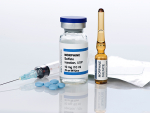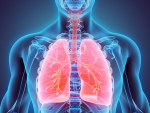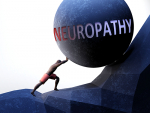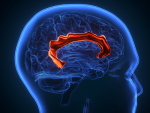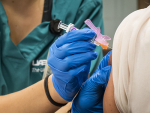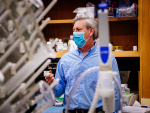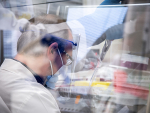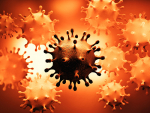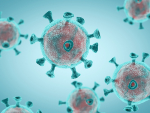Displaying items by tag: department of anesthesiology and perioperative medicine
Understanding the mechanisms underlying tolerance and hyperalgesia is essential to enhance morphine’s utility in chronic pain management.
Tagged under
Multifidus stimulation is for patients with chronic, non-surgical low back pain who demonstrate impaired function in the muscles that stabilize the spine.
Merkel cells in fingertips were known to turn mechanical force into an electrical signal, but how that signal transferred to the nerve across the synapse was unknown.
Tagged under
This new grant will be used to develop a full-scale family of devices for inhaled nitric oxide delivery for patients with pulmonary hypertension that can be used in health care facilities and for at-home care.
Tagged under
The Blazer Bridge Fund is intended to identify and assist in the development of promising ideas, discoveries, innovations and/or technologies from UAB faculty and staff that have commercial potential.
Tagged under
- release
- harbert institute for innovation and entrepreneurship
- school of education
- school of engineering
- school of medicine
- department of otolaryngology
- department of anesthesiology and perioperative medicine
- department of microbiology
- department of medicine
- division of hematology and oncology
- division of pulmonary allergy and critical care medicine
- division of gerontology geriatrics and palliative care
The new treatment involves using a spinal cord stimulator that sends electrical impulses into the spinal cord. The device responds to the spinal cord in real time and can adjust the electrical output 50-100 times per second based on what is happening in the spinal cord.
Tagged under
Uncovering a pathophysiological mechanism that initiates, transitions and sustains neuropathic pain holds promise for treating neuropathic pain.
Tagged under
The temporary PNS device can be used to treat chronic nerve pain, as well as joint pain and back pain, for patients for whom oral medications are not effective, or who wish to minimize the use of medications or more invasive procedures.
Tagged under
Having a bacterial infection at the same time as COVID-19 is a greater risk factor for COVID-19 severity and mortality than previously described risk factors such as advanced age, male sex or various comorbidities.
Tagged under
- release
- school of medicine
- department of medicine
- department of microbiology
- department of anesthesiology and perioperative medicine
- department of pediatrics
- division of pulmonary allergy and critical care medicine
- division of neonatology
- division of pediatric critical care medicine
- division of infectious diseases
- hugh kaul personalized medicine institute
- uab medical scientist training program
Even when at odds with his health, Matalon continued his academic excellence and service to the field of lung disease research.
Tagged under
Chronic pain often leads to depression, which increases suffering and is clinically difficult to treat. Understanding the underlying mechanism identifies a potential therapeutic target for treatment.
Tagged under
Tagged under
Tagged under
- release
- advancement
- office of the president
- office of the provost for student and faculty success
- department of anesthesiology and perioperative medicine
- department of neurology
- department of biochemistry and molecular genetics
- department of cell developmental and integrative biology
- department of clinical and diagnostic sciences
- department of dermatology
- department of emergency medicine
- department of family and community medicine
- department of genetics
- department of medical education
- department of medicine
- department of microbiology
- department of neurobiology
- department of neurosurgery
- department of obstetrics and gynecology
- department of ophthalmology and visual sciences
- department of orthopaedic surgery
- department of otolaryngology
- department of pathology
- department of pediatrics
- department of pharmacology and toxicology
- department of physical medicine and rehabilitation
- department of psychiatry and behavioral neurobiology
- department of radiation oncology
- department of radiology
- department of surgery
- division of academic general pediatrics
- division of acute care surgery
- division of adolescent medicine
- division of advanced medical imaging
- division of anatomic pathology
- division of cardiothoracic surgery
- division of cardiothoracic anesthesia
- division of child abuse pediatrics
- division of clinical immunology and rheumatology
- division of community anesthesia
- division of diagnostic radiology
- division of developmental and behavioral pediatrics
- division of forensic pathology
- division of gastroenterology and hepatology
- division of gastrointestinal surgery
- division of general internal medicine
- division of general pediatrics and adolescent medicine
- division of genomics and bioinformatics
- division of gerontology geriatrics and palliative care
- division of gynecologic oncology
- division of hematology and oncology
- division of infectious diseases
- division of informatics
- division of laboratory medicine
- division of maternal fetal medicine
- division of molecular and translational biomedicine
- division of molecular imaging and therapeutics
- division of multispecialty anesthesia
- division of neonatology
- division of nephrology
- division of neuro oncology
- division of neuropathology
- division of pain medicine
- division of pediatric allergy and immunology
- division of pediatric hematology oncology
- division of pediatric cardiology
- division of pediatric critical care medicine
- division of pediatric dermatology
- division of pediatric emergency medicine
- division of pediatric endocrinology
- division of pediatric gastroenterology
- division of pediatric hospital medicine
- division of pediatric infectious diseases
- division of pediatric nephrology
- division of pediatric neurology
- division of pediatric oncology
- division of pediatric optometry
- division of pediatric pulmonary and sleep medicine
- division of pediatric rehabilitation medicine
- division of pediatric rheumatology
- division of pediatric surgery
- division of plastic surgery
- division of preventive medicine
- division of pulmonary allergy and critical care medicine
- division of reproductive endocrinology and infertility
- division of surgical oncology
- division of transplantation
- division of vascular surgery and endovascular therapy
- 1917 clinic
- acute care for elders unit
- addiction recovery program
- addiction recovery scholars
- alabama genomic health initiative
- all of us research program
- autism spectrum disorders clinic at uab
- center for addiction and pain prevention and intervention
- center for aids research
- center for clinical and translational science
- center for emerging drug discovery
- center for exercise medicine
- center for free radical biology
- center for interprofessional education and simulation
- center for genomic medicine
- center for low vision rehabilitation
- center for metabolic bone disease
- center for neurodegeneration and experimental therapeutics
- center for outcomes and effectiveness research and education
- center for palliative and supportive care
- center for pediatric onset demyelinating disease
- civitan international neuroimaging laboratory
- civitan international research center
- civitan sparks clinics
- comprehensive arthritis musculoskeletal and autoimmunity center
- comprehensive cardiovascular center
- comprehensive center for healthy aging
- comprehensive diabetes center
- comprehensive neuroscience center
- comprehensive stroke center
- comprehensive transplant institute
- deep south resource center for minority aging research
- gregory fleming james cystic fibrosis research center
- epilepsy center
- heflin center for genomic sciences
- hepatorenal fibrocystic diseases core center
- informatics institute
- institute for cancer outcomes and survivorship
- legacy of hope
- liver center
- lung health center
- mcknight brain institute
- minority health and health equity research center
- mucosal hiv and immunobiology center
- multiple sclerosis center
- national spinal cord injury statistical center
- nephrology research and training center
- obesity health disparities research center
- obrien center for acute kidney injury research
- pancreatobiliary disease center
- parkinsons disease information and referral center
- pediatric pulmonary center
- precision medicine institute
- primary care research collaborative
- spain rehabilitation center
- school of medicine
Tagged under
Tagged under
High-profile speakers show the “critical role that UAB is playing in the effort to combat this pandemic.”
Tagged under
The vaccine candidate Altimmune’s AdCOVID potently stimulated neutralizing antibody and T cell responses, as well as mucosal immunity in the respiratory tract.
Tagged under
UAB’s Center for Addiction and Pain Prevention and Intervention will conduct research that can be developed and translated into better treatments for addiction and pain.
Tagged under
- release
- school of medicine
- department of medicine
- division of infectious diseases
- department of psychiatry and behavioral neurobiology
- department of psychology
- department of neurobiology
- department of health behavior
- school of public health
- division of preventive medicine
- department of anesthesiology and perioperative medicine
- college of arts and sciences
A drug that inhibits the protease plasmin is hypothesized to reduce the infectivity and virulence of the virus, as measured by reduced need for hospitalization within a week.
Tagged under
UAB and Polish researchers propose that the COVID-19 virus acts as a microRNA “sponge” to deplete miRNA levels in ways that aid viral replication and stymie the host immune response.
Tagged under
